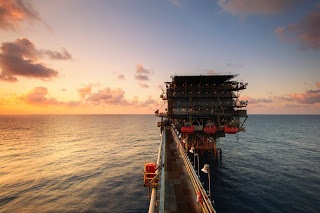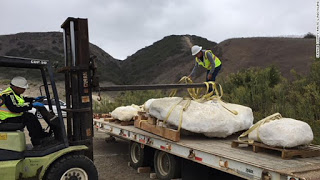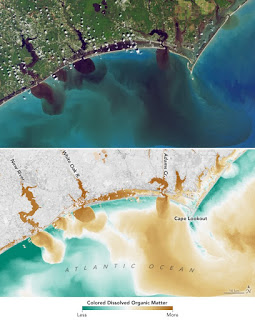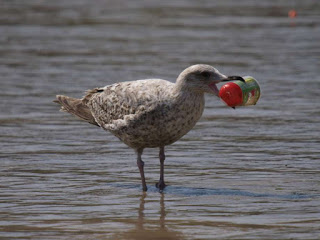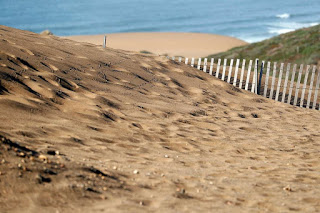Executive Order Could Open Arctic to Drilling, Disney Cruises Lobbys for Pristine Bahamas Island, Whales Might Have Once Swam Over Hollywood, Beluga Sighting in London, Hurricane Aftermath Pollution Overflow, US looks to Asia to Reduce Plastic And More.
President Trump signed an executive order Friday that could eventually open up Arctic waters and millions of coastal acres off U.S. shores to oil and gas drilling. “Today we’re unleashing American energy and clearing the way for thousands and thousands of high paying American energy jobs,” said Trump, flanked by Republican lawmakers from energy-producing states during a White House signing ceremony. “Our country is blessed with incredible natural resources including abundant offshore oil and natural gas resources, but the federal government has kept 94% of these offshore areas closed for exploration and production,” he said.
———————————————–
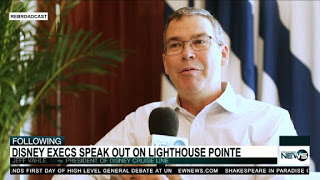 While there have been many concerns about what the planned development at Lighthouse Point could mean – not only for Eleutherans but also for the environment and a historic part of the island the residents want to keep pristine – President of Disney Cruise Line Jeff Vahle, attempted to allay fears on Wednesday as he told Eyewitness News that, because of protests and opposition to the cruise port, there have been major changes to Disney’s original plans.
While there have been many concerns about what the planned development at Lighthouse Point could mean – not only for Eleutherans but also for the environment and a historic part of the island the residents want to keep pristine – President of Disney Cruise Line Jeff Vahle, attempted to allay fears on Wednesday as he told Eyewitness News that, because of protests and opposition to the cruise port, there have been major changes to Disney’s original plans.
3. Scientists may have Uncovered an Entire New Whale Species that Lived Millions of Years Ago
Scientists believe a fossil found at a landfill in California belongs to an extinct species of whale that lived between 4 and 7 million years ago. The seven-ton fossil was unearthed in June during a construction excavation at the Prima Deshecha landfill in San Juan Capistrano, Orange County Waste & Recycling announced in a statement. A paleontologist with Paleo Solutions Lab, a company employed by the County of Orange –paleontologists must monitor construction excavations under California law — was working at the site when a large bone was spotted.
4. Beluga Whale Spotted in the London, Thames
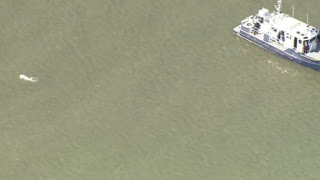 A beluga whale has been seen swimming in the River Thames. It was first spotted by ecologist and ornithologist Dave Andrews, who said it had been feeding around barges near Gravesend in Kent. The Whale and Dolphin Conservation said it was “obviously very lost and quite possibly in trouble”. Vessels are being kept clear, with the British Divers Marine Life Rescue urging the public not to get too close and “to watch it from the shore”. Tanya Ferry, environment manager at the Port of London Authority which is monitoring the whale, said it was unclear what the whale could eat. “We do have quite a lot of plastic bags, which could be quite an issue,” she said.
A beluga whale has been seen swimming in the River Thames. It was first spotted by ecologist and ornithologist Dave Andrews, who said it had been feeding around barges near Gravesend in Kent. The Whale and Dolphin Conservation said it was “obviously very lost and quite possibly in trouble”. Vessels are being kept clear, with the British Divers Marine Life Rescue urging the public not to get too close and “to watch it from the shore”. Tanya Ferry, environment manager at the Port of London Authority which is monitoring the whale, said it was unclear what the whale could eat. “We do have quite a lot of plastic bags, which could be quite an issue,” she said.Flooding from Hurricane Florence, which battered the Carolinas this month, is so severe that NASA was able to spot darkened, contaminated rivers flowing into the Atlantic Ocean. Nearly 8 trillion gallons of rain fell on North Carolina during the storm, according to the National Weather Service in Raleigh. That deluge took a devastating toll, swelling rivers and inundating homes. NASA satellite images released this week reveal just how engorged, and polluted the rivers and other waterways became. One image, captured on Sept. 19, indicates that “soils, sediments, decaying leaves, pollution, and other debris have discolored the water in the swollen rivers, bays, estuaries, and the nearshore ocean,” according to NASA. The discoloration is visible as navy blue and black tributaries spilling from the coast in unsettling plumes.
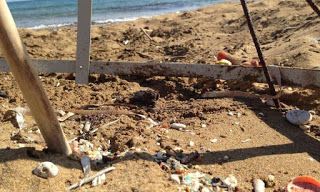 Microplastics have been found deep in the sand on beaches where sea turtles lay their eggs. University of Exeter scientists found an average of 5,300 particles of plastic per cubic meter at depths of 60cm (2ft) on beaches in Cyprus used by green turtles and loggerheads. At the surface, up to 130,000 fragments of plastic were found per cubic metre—the second-worst level ever recorded on a beach (the worst was in Guangdong, South China). Researchers say that if conditions worsen such pollution could eventually begin to affect hatching success and even the ratio of male and female turtle hatchlings.
Microplastics have been found deep in the sand on beaches where sea turtles lay their eggs. University of Exeter scientists found an average of 5,300 particles of plastic per cubic meter at depths of 60cm (2ft) on beaches in Cyprus used by green turtles and loggerheads. At the surface, up to 130,000 fragments of plastic were found per cubic metre—the second-worst level ever recorded on a beach (the worst was in Guangdong, South China). Researchers say that if conditions worsen such pollution could eventually begin to affect hatching success and even the ratio of male and female turtle hatchlings.
A landmark 13-year study published in Nature Climate Change has provided the first evidence that climate change is affecting terrestrial ecosystems in East Antarctica. While West Antarctica and the Antarctic Peninsula are among the most rapidly warming places on the planet, East Antarctica has not warmed in the same way and appeared to have so far escaped the strongest impacts of climate change.
So where will they start? Never mind how to reduce their city’s greenhouse-gas emissions; how will they know what’s spewing carbon dioxide in the first place? Maybe Google will do it for them. Or, at least, do it with them. Google has started estimating greenhouse-gas emissions for individual cities, part of what it recently described as an ambitious new plan to deploy its hoard of geographic information on the side of climate-concerned local leaders.
Senate Republicans and Democrats are urging President Donald Trump to take steps to pressure China, Indonesia, and other Asian countries to reduce the amount of plastic they are dumping into the ocean. The Senate is expected to vote later today on legislation that seeks to reduce the growing volume of plastic waste floating around the world’s oceans and has already passed the House. “Importantly, it encourages the Trump administration to pursue an international agreement with regard to this challenge,” Sen. Dan Sullivan, R-Alaska, said at a hearing Wednesday.
10. ‘No Such Animal as Clean Coal’: Mayor of Texas City Powered by Solar and Wind Pokes the Bear

Despite being a Republican, the mayor of a Texas city that runs fully on renewable energy is taking on Donald Trump’s pro-coal policies. Georgetown, with a population of almost 70,000, is perhaps the largest city in the United States to look solely to wind and solar to keep the lights on and is the first city in the Lone Star State to do so. Mayor Dale Ross is in Calgary speaking at the 2018 Alberta Climate Summit this week and stopped in to share the story with CBC’s The Homestretch.
Not far from Germany’s Rhine River, a fight to thwart giant excavators from grinding away what’s left of the 12,000-year-old Hambach forest came to a head this month as thousands of protesters faced off with police in a tense, and at times violent, showdown. Activists formed a human shield by occupying dozens of self-made tree houses, set up barricades in the woods and threw stones and even Molotov cocktails toward police.
 Deep-sea oil drillers are once again riding the wave of investor enthusiasm that next year will be better for profits. But this time there seems to be a bigger chance it will actually happen, according to analysts at Credit Suisse Group AG and Morgan Stanley. Some of the world’s biggest owners of rigs that drill oil wells in more than two miles of water, including Transocean Ltd., Ensco Plc and Diamond Offshore Drilling Inc., saw rallies in their shares near the end of 2016 and 2017, only to see their stocks tumble by the start of the following year as reality set in.
Deep-sea oil drillers are once again riding the wave of investor enthusiasm that next year will be better for profits. But this time there seems to be a bigger chance it will actually happen, according to analysts at Credit Suisse Group AG and Morgan Stanley. Some of the world’s biggest owners of rigs that drill oil wells in more than two miles of water, including Transocean Ltd., Ensco Plc and Diamond Offshore Drilling Inc., saw rallies in their shares near the end of 2016 and 2017, only to see their stocks tumble by the start of the following year as reality set in.Disappearing glaciers were an early sign of trouble for the nation’s wildlands. But the mark of global warming on the American landscape didn’t end there. Devastating wildfires have since ravaged Yosemite. Rising seas have encroached on the Point Reyes Peninsula. Vast stands of trees have died in and around Kings Canyon.
A study released Monday finds that the country’s national parks, which were designed to set aside and protect the most pristine and coveted spots in the United States, are being hit disproportionately by climate change.

